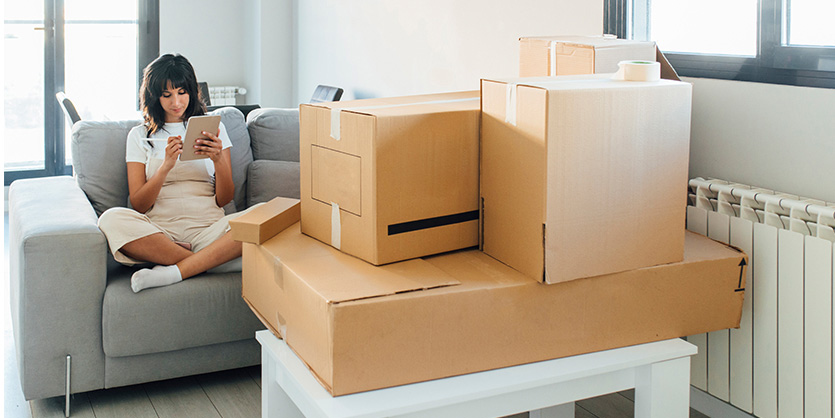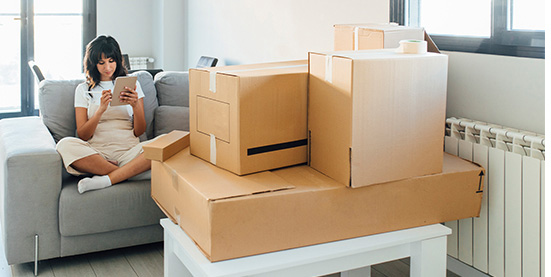
Get your 2 highest-use days a week FREE + $200 in bonus bill credits for extra savings.

Straightfoward plan with a locked-in energy charge.

Designed exclusively for smaller spaces.
Pricing Details
Early cancellation fee
Pricing Details
Early cancellation fee
Texas electricity pricing includes charges from Reliant and delivery charges from your TDSP/utility (CenterPoint Energy). The combined charges below divided by your total monthly usage equals your average price per kWh.
1 The total amounts assessed by a Transmission Distribution Service Provider (TDSP) for the delivery of electricity to a customer over poles, wires and other TDSP facilities, not including discretionary charges.
Moving to a new place can be an exciting adventure, but it's worth considering the importance of being financially prepared. Sticking to a budget can help you avoid unnecessary expenses and ensure a smooth transition. Here are some additional factors to consider when planning your move:
When you're moving, there may be items that you need to store temporarily. Whether you're downsizing or your new place isn't ready yet, it's smart to account for storage costs. You can research storage facilities in your area and compare their prices and services. Consider factors such as location, security and access hours. Try to determine how long you'll need storage and factor in the monthly fees. Some facilities offer discounts for long-term rentals, so inquire about any available promotions.
In addition to storage, consider investing in organizational tools to keep your belongings tidy and easily accessible. Shelving units, plastic bins and storage containers can help maximize space and prevent damage during the move. Labeling your boxes and creating an inventory list can save you time and effort when unpacking. You can easily find your belongings and ensure that nothing is misplaced or lost.
Insurance coverage can shelter you from added expense when you move. With the right insurance, you'll be saved from the cost of replacing items that break during transport to your new home.
Here are some actions to consider:
Transit insurance for valuable belongings alone could go a long way to providing peace of mind, but you can likely get a policy to cover all your things.
Updating your address can help ensure that your important mail and packages are delivered to the correct location. You can start by notifying your bank, credit card companies and insurance providers about your upcoming move. Additionally, inform any subscription services or memberships you have about your change of address.
To ensure that you receive all your mail during the transition period, consider setting up mail forwarding with your local post office. This service allows your mail to be redirected from your old address to your new address for a specified period.
When moving to a new home, there may be tasks or projects that require attention. This could range from minor repairs to larger-scale renovations. If possible, plan for these expenses in your budget. Look into the condition of your new home and try to identify any areas that need improvement or repair.
If you think of your new home in terms of its big parts, it can help you thoroughly evaluate the overall condition of the place.
Below is one possible checklist:
If you plan to hire professionals for repairs, do your best to get multiple quotes so you can compare prices. And earmark some funds for repairs that might evade initial inspections.
During your move, you may require an electrician, plumber, handymen or even contractors. For example, you might need assistance with setting up utilities, installing fixtures or handling any unexpected repairs in your new home.
Research local service providers in your area and gather recommendations from friends, family or real estate agents. Request quotes from multiple professionals to compare prices and evaluate their expertise. While it may be tempting to choose the lowest-priced option, you can weigh labor costs against getting professionals with good customer reviews and qualifications.
If you're moving out of state, updating your driver's license and vehicle registration should be on your checklist. Each state has specific requirements and timelines for updating these documents. It's a good idea to familiarize yourself with the rules and regulations of your new state regarding driver's licenses and vehicle registration.
If you contact the appropriate state agencies responsible for driver's licenses and vehicle registrations, they can help you understand the necessary steps. These steps may include providing you with the required forms and information on any associated fees. Gather the necessary documentation, such as proof of residency, vehicle ownership and identification. If you plan ahead and allow sufficient time to complete these tasks, you should be able to handle all the details before the deadlines your new state observes.
Moving to a new home usually takes some budgeting. As you're putting your spending plan together, here are a few factors to keep in mind:
Doing some research should keep these things affordable and efficient. By staying organized, tracking your expenses and referring to your moving budget checklist, you should be well prepared to navigate the financial aspects of your move.
Moving to Texas? Learn a little more about the state before you get here. Click here to explore our "Getting to know Texas" page.


